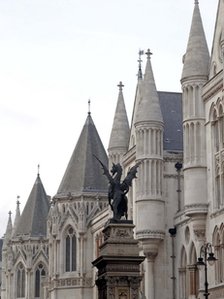 |
|
Lord
Justice Leveson's inquiry will look at the culture,
practices and ethics of the press |
As the Leveson Inquiry into phone hacking starts on Monday, what can we
expect the coming weeks to bring?
It's an unremarkable location with a fascinating recent history.
At the end of one of the corridors at the Royal Courts of Justice (there
are some three and a half miles of corridors inside the building on the
Strand) sits Court 73, a modern addition to a striking Victorian
structure.
It was here that Tony Blair came, when prime minister, to give evidence
at the Hutton Inquiry which was looking into the death of Dr David
Kelly. Its findings led to the premature departure of two of the BBC's
most senior executives.
The courtroom also played host to the, at times, painfully sad 7 July
inquests and the, at times, poignant Diana inquest.
Now, it'll be the setting for a hearing which could transform the way
newspapers operate in this country.
Harsh light
With the News of the World phone-hacking scandal still fresh in people's
minds, Lord Justice Leveson has been given the task of shining a
potentially harsh light on the culture, practices and ethics of the
press.
After he has done so, and within a tight time frame, the Appeal Court
judge must decide whether or not the way newspapers regulate themselves
at the moment is satisfactory. If he concludes it isn't, he must come up
with an alternative.
It will not be straightforward. Lord Justice Leveson's greatest
challenge will be that he is, in his own words, "putting the cart before
the horse".
Normally, inquiries are set up after something has happened; the dust
has settled; and lessons need to be learnt. The Taylor inquiry,
following the Hillsborough disaster, is just one such example.
Surprising absences
But Leveson will be conducting his work at the same time as police
officers are continuing theirs. Fourteen people, most of whom are former
News of the World employees, have been arrested by detectives seeking to
establish if crimes have been committed.
|
My
fear is that if you look at the history of investigations
into these sorts of areas, over the last 50 years, rather
more has been put on the shelf than has been activated. ”
End Quote
Lord Justice Leveson |
The Metropolitan Police and the director of public prosecutions are
worried that something said or revealed inside Court 73 might derail any
future trials, if there are to be any.
Lord Justice Leveson will try to navigate a path through these concerns.
The nuts and bolts of exactly what went on at the now defunct Sunday
tabloid will be dealt with in part two of his inquiry which will only
begin once the criminal investigation has ended.
Part one, starting on Monday, will paint a broad-brush picture of the
News of the World and avoid too much detail. Leveson has already warned
that there may be what some might see as "surprising omissions" when it
comes to who will give evidence.
He has ruled that certain (as yet unspecified) individuals who are
suspects in the police investigation need not come to the courtroom. But
the senior judge is insistent his hearing can go ahead without
prejudicing the police investigation or any prosecution.
Famous 'victims'
Central to this inquiry will be those who maintain they are the victims
of the way the British press operates. According to their barrister,
they are taking part not out of financial gain but to serve the public
good.
More than 50 people who say they have suffered because of phone hacking
or the activities of reporters which were either unlawful or unethical,
will play a key role. They include the parents of Madeleine McCann; JK
Rowling, the creator of Harry Potter; and the family of the murdered
teenager, Milly Dowler.
 |
|
The Royal
Courts of Justice will be the setting for the inquiry |
In the coming weeks, several of the "victims" will sit where Tony Blair,
Mohammed Al Fayed and others have sat and give evidence. It's likely to
be powerful and possibly damning testimony.
The former inhabitants of Fleet Street will also have their say. One way
forward has already been laid out. In a rare public speech, Paul Dacre,
the Daily Mail's editor-in-chief, delivered a powerful defence of the
status quo - albeit, he acknowledged, in a "considerably beefed-up
form".
He argued that the self-regulation overseen by the Press Complaints
Commission should continue; his papers will acknowledge their mistakes
in print every day; and he wondered whether a Newspaper Industry
Ombudsman should be appointed to deal with press standards.
This proposal will be just one of many competing ideas that Lord Justice
Leveson will hear about in the coming months. He'll be helped by six
experts but the conclusions of his report will be his, and his alone.
He is acutely conscious of how reports can be published and then left to
gather dust on a shelf.
"My fear", he said last month, "is that if you look at the history of
investigations into these sorts of areas, over the last 50 years, rather
more has been put on the shelf than has been activated". |



